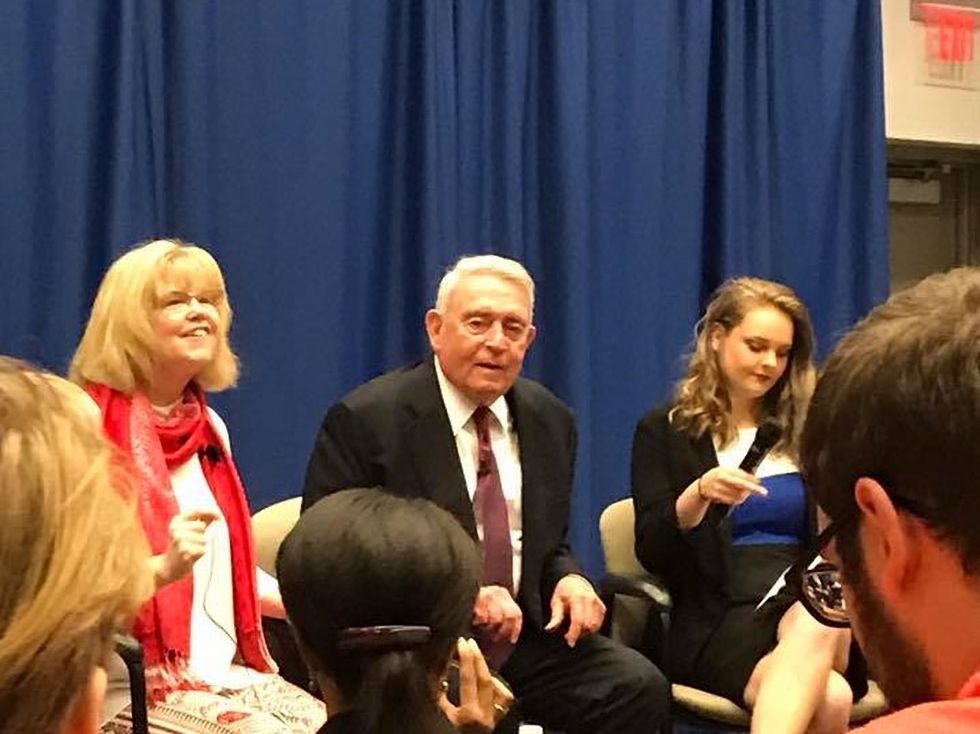Renowned journalist Dan Rather offered advice about communication, leadership and life to an audience of students and locals at Kent State University’s Presidential Speaker Series May 4.
Rather began with a moment of silence for the victims of Kent State’s May 4, 1970 shooting. He then discussed the importance of dissent and the voices of the youth before telling the audience the eight most important things he learned throughout his life.
“To lead a noble life is to live a life of service to others,” Rather said.
The most important characteristics to exhibit in life are humility, gratitude, modesty, forgiveness, mercy and love.
Rather lives by the motto “If it is to be, it is up to me.”
“Learn by hearts,” Rather said.
A few of the things Rather learned throughout his life were about being an effective leader.
“The best leaders tend to be excellent listeners,” Rather said.
The best learners, workers and leaders are strong communicators. They must know how to communicate with large groups, small groups and one-on-one.
The communicators are good writers, and they know how to write well both in short- and long-form. Handwritten notes and letters are important, particularly at dramatic times.
Finally, the people who accomplish the most train themselves to think critically and analytically by being readers.
Martin Luther King Jr., Mother Teresa, Nelson Mandela and Dalai Lama were mentioned by Rather as the individuals having the best character of anyone he has interviewed. He noted King for his courage, Mother Teresa for her sacrifice for others, Mandela for his ability to forgive while never forgetting and Dalai Lama for his optimism and meditation.
In addition to following this advice on character, Rather had advice for each member of the audience.
“Dedicate yourself to active citizenship,” Rather said.
It is important to focus on the core values of what unites us as a country, Rather said.
“You must not waver, hesitate, cower, be intimidated or get distracted,” Rather said. “Work as a citizen is essential, noble work.”
Once Rather ended his speech, he did a question and answer session moderated by Eric Mansfield, Kent State University’s Executive Director of Media Relations.
Mansfield asked Rather about journalism’s value. Rather said he was attracted to journalism because he wanted to be a part of something bigger than himself, and he wanted a life that counts and matters.
Rather said when journalism is done right, it holds our country together.
Mansfield asked Rather if President Trump saying that the media is an “enemy of the people” galvanized journalists or served as a threat to journalists. Rather does not believe this galvanized journalists.
President Trump isn’t the first American president to criticize the media, Rather pointed out. However, he said the phrase “enemy of the people” echoes what we know of authoritarian regimes.
Rather quickly pointed out that he isn’t “left-winged, right-winged, or chicken-winged… but this isn’t normal.”
In an additional response to President Trump’s criticism, Rather believes some of the best investigative reporting has been done over the past year and a half.
Additionally, Rather said he reads six newspapers a day, and he trusts AP and Reuters as ethical worldwide news gatherers above all else.
After briefly discussing the unprecedented time for journalism, he repeated some of the advice he gave to students in the College of Communication and Information at a private question and answer session earlier that day.
“Don’t lose your idealism,” Rather said. “And constantly dedicate yourself to becoming a better writer.”
Mansfield then asked about the May 4, 1970 shooting.
The events on Kent State University’s campus had an effect on Nixon and his administration, Rather believes. It prompted a national conversation. In his personal opinion and speculation, the Vietnam War would have lasted longer if not for the Kent State University tragedy.
Rather believes it is essential to teach each new generation about the May 4, 1970 shooting, both what happened and why it mattered.
To conclude An Evening with Dan Rather, Rather gave his own definition of journalism.
“Journalism is not an exact science, but a crude art,” Rather said.
At its core, it is about trying to get the truth—or as close to the truth as possible.
Rather said that throughout his life, his “professional North Star” was that he simply wanted to be a great reporter. He said that despite his flaws and regrets in life, he would absolutely go back and do it all again.
“I was able to live my dream and am still living it.






 The minimum wage is not a living wage.
StableDiffusion
The minimum wage is not a living wage.
StableDiffusion
 influential nations
StableDiffusion
influential nations
StableDiffusion











